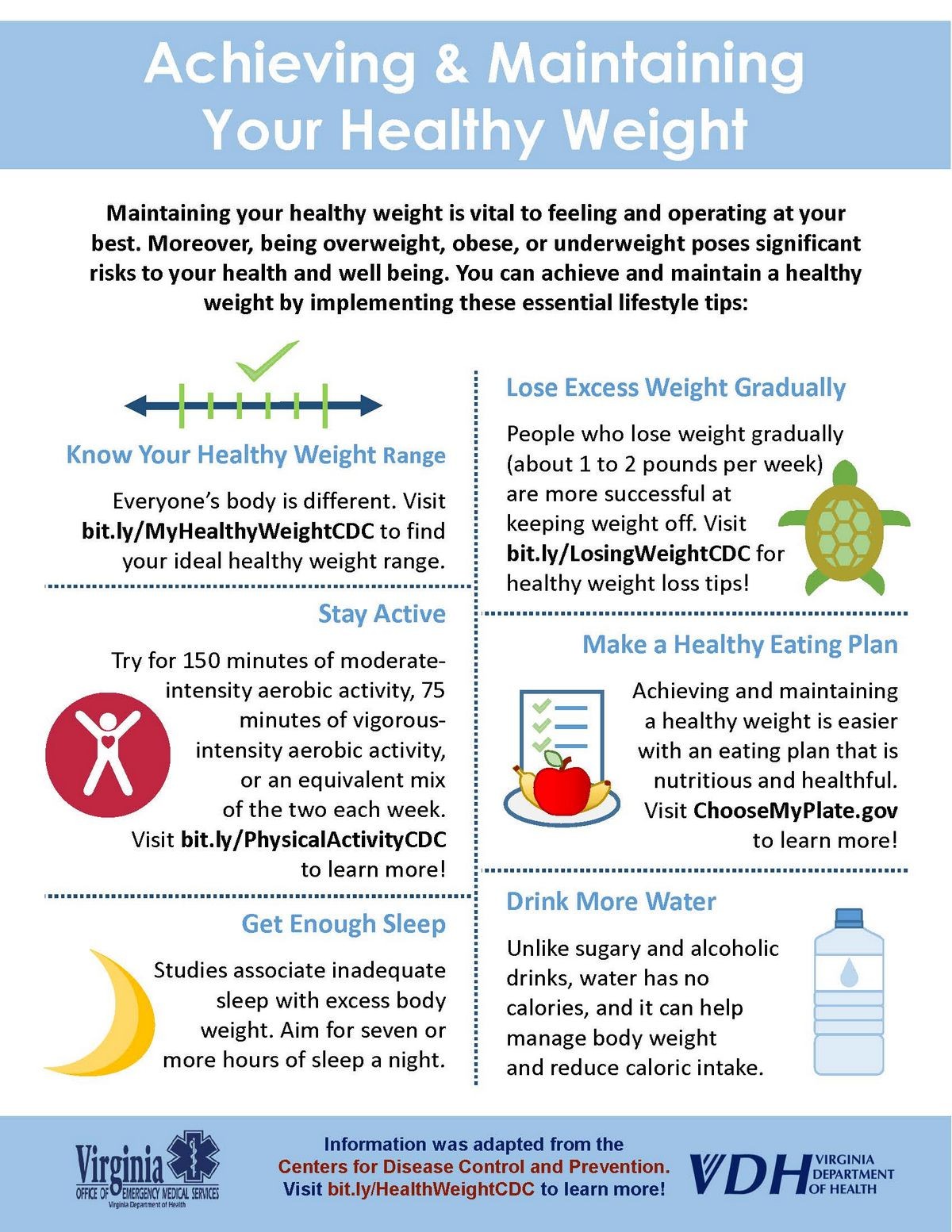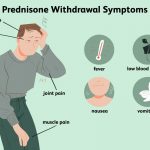
Contents
Weight Management
When it comes to adults and children, different methods are used to determine if weight is appropriate for height. Adults should learn their BMI (click here for calculations). Not all adults with a "healthy" BMI are at their optimal weight.
- Some may have excess fat and little muscle.
- A BMI above the healthy range is less healthy for most people; but it may be acceptable if someone has lots of muscle, a large body frame, and little fat.
- The higher one’s BMI is above the healthy range, the greater the weight-related risk. If a person’s BMI exceeds the healthy range, weight loss may be beneficial, especially if there are other health risk factors.
- BMIs slightly below the healthy range may still be healthy unless they are due to illness.
There is no one ideal body size for children. However, many children in the United States are overweight. If you have concerns about your child’s body size, consult a health-care professional.
Monitor your weight and waist measurement, and take action if either increases. If your BMI is greater than 25, try to avoid further weight gain. If you are middle-aged or elderly and your waist measurement increases, you may be gaining fat and losing muscle. If so, make an effort to eat less and be more active.
How should people assess their weight?
- Weigh yourself and have your height measured. Determine your BMI category. The higher the BMI category, the greater the risk for health problems.
- Measure around the waist while standing, just above the hip bones. If it exceeds 35 inches for women or 40 inches for men, there is likely excess abdominal fat. This excess fat may increase the risk of health problems, even if the BMI is within the healthy range.
Learn about other risk factors
The more risk factors a person has, the more likely they are to benefit from weight loss if overweight or obese.
- Is there a personal or family history of heart disease?
- Is the person a male over 45 years or a postmenopausal female?
- Does the person smoke?
- Does the person have a sedentary lifestyle?
- Has a doctor diagnosed the person with high blood pressure, abnormal blood lipids (high LDL cholesterol, low HDL cholesterol, high triglycerides), or diabetes?
Managing weight
Genes influence a person’s tendency to gain weight. The risk of weight gain increases when food is abundant and when using devices and vehicles to save time and energy. Although it can be challenging to avoid weight gain in these circumstances, it is possible to manage weight through food and physical activity choices.
What strategies are effective for weight management?
While various diet plans can help with weight loss, long-term changes in eating habits are crucial for success. Instead of following a restrictive diet that is difficult to sustain indefinitely, it is better to modify eating habits in a way that promotes both weight loss and weight maintenance. To facilitate weight management, make long-term changes to eating behavior and physical activity. Consider the following tips:
- Build a healthy foundation and make sensible choices.
- Choose a nutritious variety of foods that include vegetables, fruits, whole grains, skim milk, fish, lean meat, poultry, or beans.
- Opt for low-fat and low-sugar foods most of the time.
- Eating mostly vegetables, fruits, and grains promotes satiety, good health, and weight management.
- Practice portion control regardless of the food.
- Incorporate more physical activity throughout the day.
- For weight maintenance after weight loss, aim for at least 45 minutes of moderate physical activity daily (60 minutes for children).
- Over time, even slight reductions in calorie intake and increases in physical activity can prevent weight gain or facilitate weight loss.
- Do not give up after making an unhealthy eating choice. Acknowledge the mistake and strive to make good choices as often as possible.
QUESTION
How do people successfully maintain weight loss?
Long-term changes are essential for maintaining weight loss. Regardless of how successful a diet is, weight will return if one reverts to previous eating habits. As mentioned earlier, adopting a "no-diet" approach to healthy eating by modifying dietary habits has a better likelihood of success compared to following a highly restrictive diet for a limited time.
What are the benefits of weight loss?
Being overweight is associated with various health risks, and obesity (typically defined as having a BMI over 30) is even more perilous. Some health risks linked to overweight and obesity include:
- Type 2 diabetes and insulin resistance: Insulin resistance means that the pancreas has to produce increasing amounts of insulin to allow glucose to enter cells and be used for energy. Because fat cells are more resistant to insulin than muscle cells, overweight individuals tend to produce more insulin to maintain stable blood glucose levels. Once the pancreas can no longer keep up with this demand, blood glucose levels rise, resulting in type 2 diabetes.
- Cancers: Obesity increases the risk of certain cancers, including colon cancer, prostate cancer, endometrial cancer, gallbladder cancer, and postmenopausal breast cancer in women.
- Heart attack and stroke
- Hypertension
- Osteoarthritis
- Gout
- Sleep apnea and other breathing problems, as well as an increased susceptibility to respiratory infection and asthma
- Heart failure
- Gallstones
- Stillbirth and pregnancy-induced hypertension
- Stress incontinence
- Increased risk of postsurgical infection and other surgery complications
- Infertility
- Varicose veins
- Reflux esophagitis
Weight reduction and maintaining a healthy body weight can mitigate many of these risks.
What complications are associated with excessive thinness (underweight)?
Being too thin (underweight, often defined as having a BMI below 18.5) can result from anorexia nervosa, other eating disorders, or loss of appetite. Chronic medical conditions, cancers, and infections can also lead to severe weight loss. Being underweight is linked to menstrual irregularity (which can cause infertility) and osteoporosis in women, as well as an increased risk of early death in both women and men.
Many individuals, especially women, worry about body weight even when their weight is within the normal range. Excessive concern about weight may lead to unhealthy behaviors such as excessive exercise, self-induced vomiting, and the misuse of laxatives or other medications. These practices can exacerbate concerns about weight.
Unexplained weight loss can sometimes indicate an underlying health problem. If you experience sudden weight loss without intentionally trying to reduce or lose weight, consult a doctor to determine if a medical condition is responsible.
Medical supervision is important when attempting to regain a significant amount of weight. Just as weight loss involves consuming fewer calories than expended through daily activities, weight gain requires a greater calorie intake than necessary for body functions and activities. Even when trying to consume extra calories, it is essential to consider the nutritional content of foods and limit consumption of high-fat foods, refined sugars, and other nutritionally poor choices. Some experts also recommend weight training or other exercises to promote muscle development during weight gain. If you need to gain weight, consult a doctor for an appropriate eating and exercise plan to help you achieve this goal.
Severely underweight individuals who are attempting to regain weight may experience a condition called refeeding syndrome if weight is regained too rapidly. This syndrome involves various metabolic abnormalities and electrolyte imbalances that can result in serious or even fatal complications. Refeeding syndrome primarily affects extremely underweight individuals, such as those with severe anorexia nervosa (those with less than 75% of normal body weight). Sometimes, hospitalization and close monitoring of overall nutritional and metabolic status is necessary for those who are severely underweight during the initial phase of weight gain.
For those who are severely underweight and attempting to regain weight, a condition known as refeeding syndrome may occur as a complication of attempts to regain weight too rapidly. This syndrome is characterized by a number of metabolic abnormalities and imbalances in electrolyte levels that may result in serious or even fatal complications. Refeeding syndrome occurs most often in people who are extremely underweight, such as those suffering from severe anorexia nervosa (those with less than 75% of a normal body weight). Sometimes severe underweight requires hospitalization during the initial weight gain phase in order to monitor the individual’s overall nutritional and metabolic status.


